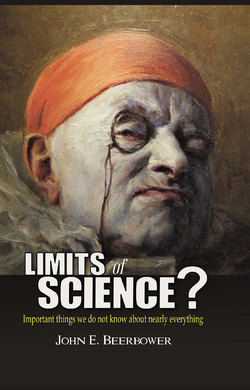Читать книгу Limits of Science? - John E. Beerbower - Страница 27
На сайте Литреса книга снята с продажи.
Revolutions?
ОглавлениеSome philosophers of science disagree with the characterization of these shifts as revolutions. Stephen Toulmin disputed Kuhn’s formulation, describing the changes in worldview that ultimately occur as gradual developments with multiple inputs from many sources. The groundwork is laid over time by new insights and new discoveries in a variety of scientific fields. Toulmin was a contrarian in several ways, some more of which we will note later, but his disagreement on this point does not detract from the observations being offered here. Both philosophers of science agree that paradigm shifts result from the confluence of numerous developments in the scientific community and the society in which the scientists function.39
Professor Barrow argues that contemporary physics is defined or constrained by the successes of existing established theories. The established theories would constitute special limiting cases of the yet to be discovered underlying comprehensive theory. The underlying theory, if discovered, would both open new insights and explain the interconnections of the existing theories. He argues that “[r]eal advances in our understanding of the physical world always seem to involve” one or more of six types of development, ranging from “revelation” to “enumeration”. The Constants of Nature, pp.60–66. Professor Barrow disputes the term “revolution” as an accurate description of the progress of the sciences for seeming to diminish the interrelatedness and interdependency of the theories and ideas.
Philosopher of science Peter Lipton, as indicated above, defended a type of inductive reasoning. He used “inductive” to refer to any inferences other than those that are deductive, i.e., those inference that are the logically necessary conclusions from the premises. Thus, “[i]nductive inference is … a matter of weighing evidence and judging probability, not of proof.” Inference to the Best Explanation (Second Edition), p.5. “If an inference is inductive, then by definition it is underdetermined by the evidence and the rules of deduction. …By definition, even a good inductive argument is one where it is possible for there to be true premises but a false conclusion.” Id., p.7. In this formulation, the problem of induction is the question of “[h]ow … we go about making these judgments, and why [we] should … believe they are reliable,” questions of description and justification. Id., p.5. In other words, the “problem” is an invitation to try to understand how we actually make sense of the world and successfully make predictions about it. As his title suggests, Lipton described the process of science as the continual replacement of one theory by another, where the successor appears to present the “better” explanation.
A somewhat different approach was taken by philosopher of science Imre Lakatos. He described science as a “research programme.” See “Science and Pseudoscience,” Philosophical Papers, vol. 1, pp.1–7. He observed that it is misleading to focus on particular hypotheses in isolation. A scientific theory will have a “hard core” of propositions surrounded by auxiliary hypotheses that are dispensable. The research programme is “a powerful problem solving machine” that incorporates anomalies as it evolves. The most important feature to Lakatos is that the effective and successful research programmes “predict novel facts, facts which had been either undreamt of, or have indeed been contradict by previous or rival programmes.” Such programmes will be either “progressing” or “degenerating.” The degenerating programmes will eventually be abandoned and the progressing programmes will attract proponents and young talent, because they will be perceived as where the action is.
Over time, the progressing programmes will replace the degenerating programmes...“Criticism is not a Popperian quick kill, by refutation: there is no refutation without a better theory. Kuhn is wrong in thinking that scientific revolutions are sudden, irrational changes in vision.”
We should note in passing that these criticisms, while punchy, are certainly overstated. Popper contemplated a process of competition among theories, not just the rejection of any theory that failed the falsification test; Kuhn contemplated more than an irrational change in worldview. Similarly, the disputes over whether the paradigm shifts are revolutions are neither really relevant nor contrary to the notion that the scientific advances involve significant or fundamental changes in worldviews or in the accepted and acceptable (dominant) explanatory paradigms.
